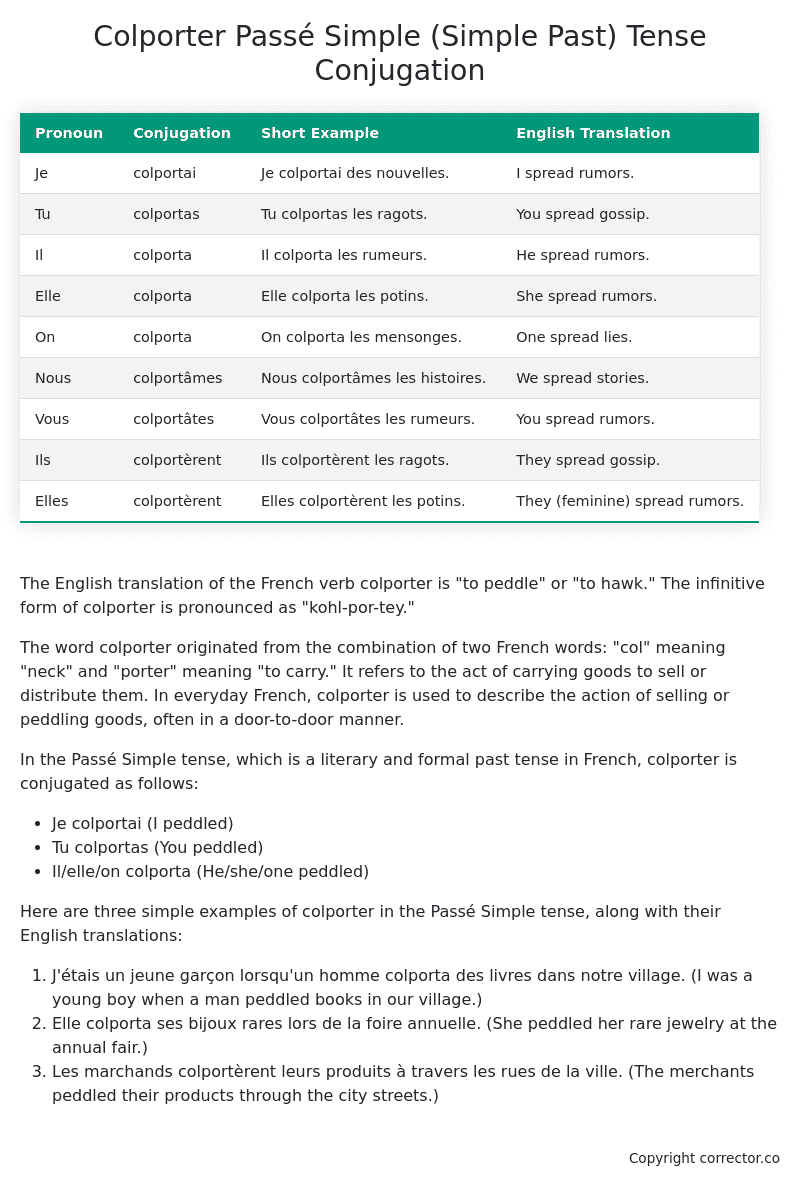Passé Simple (Simple Past) Tense Conjugation of the French Verb colporter
Introduction to the verb colporter
The English translation of the French verb colporter is “to peddle” or “to hawk.” The infinitive form of colporter is pronounced as “kohl-por-tey.”
The word colporter originated from the combination of two French words: “col” meaning “neck” and “porter” meaning “to carry.” It refers to the act of carrying goods to sell or distribute them. In everyday French, colporter is used to describe the action of selling or peddling goods, often in a door-to-door manner.
In the Passé Simple tense, which is a literary and formal past tense in French, colporter is conjugated as follows:
- Je colportai (I peddled)
- Tu colportas (You peddled)
- Il/elle/on colporta (He/she/one peddled)
Here are three simple examples of colporter in the Passé Simple tense, along with their English translations:
- J’étais un jeune garçon lorsqu’un homme colporta des livres dans notre village. (I was a young boy when a man peddled books in our village.)
- Elle colporta ses bijoux rares lors de la foire annuelle. (She peddled her rare jewelry at the annual fair.)
- Les marchands colportèrent leurs produits à travers les rues de la ville. (The merchants peddled their products through the city streets.)
Table of the Passé Simple (Simple Past) Tense Conjugation of colporter
| Pronoun | Conjugation | Short Example | English Translation |
|---|---|---|---|
| Je | colportai | Je colportai des nouvelles. | I spread rumors. |
| Tu | colportas | Tu colportas les ragots. | You spread gossip. |
| Il | colporta | Il colporta les rumeurs. | He spread rumors. |
| Elle | colporta | Elle colporta les potins. | She spread rumors. |
| On | colporta | On colporta les mensonges. | One spread lies. |
| Nous | colportâmes | Nous colportâmes les histoires. | We spread stories. |
| Vous | colportâtes | Vous colportâtes les rumeurs. | You spread rumors. |
| Ils | colportèrent | Ils colportèrent les ragots. | They spread gossip. |
| Elles | colportèrent | Elles colportèrent les potins. | They (feminine) spread rumors. |
Other Conjugations for Colporter.
Le Present (Present Tense) Conjugation of the French Verb colporter
Imparfait (Imperfect) Tense Conjugation of the French Verb colporter
Passé Simple (Simple Past) Tense Conjugation of the French Verb colporter (You’re reading it right now!)
Passé Composé (Present Perfect) Tense Conjugation of the French Verb colporter
Futur Simple (Simple Future) Tense Conjugation of the French Verb colporter
Futur Proche (Near Future) Tense Conjugation of the French Verb colporter
Plus-que-parfait (Pluperfect) Tense Conjugation of the French Verb colporter
Passé Antérieur (Past Anterior) Tense Conjugation of the French Verb colporter
Futur Antérieur (Future Anterior) Tense Conjugation of the French Verb colporter
Subjonctif Présent (Subjunctive Present) Tense Conjugation of the French Verb colporter
Subjonctif Passé (Subjunctive Past) Tense Conjugation of the French Verb colporter
Subjonctif Imparfait (Subjunctive Imperfect) Tense Conjugation of the French Verb colporter
Subjonctif Plus-que-parfait (Subjunctive Pluperfect) Tense Conjugation of the French Verb colporter
Conditionnel Présent (Conditional Present) Tense Conjugation of the French Verb colporter
Conditionnel Passé (Conditional Past) Tense Conjugation of the French Verb colporter
Conditionnel Passé II (Conditional Past II) Tense Conjugation of the French Verb colporter
L’impératif Présent (Imperative Present) Tense Conjugation of the French Verb colporter
L’impératif Passé (Imperative Past) Tense Conjugation of the French Verb colporter
L’infinitif Présent (Infinitive Present) Tense Conjugation of the French Verb colporter
L’infinitif Passé (Infinitive Past) Tense Conjugation of the French Verb colporter
Le Participe Présent (Present Participle) Tense Conjugation of the French Verb colporter
Le Participe Passé (Past Participle) Tense Conjugation of the French Verb colporter
Struggling with French verbs or the language in general? Why not use our free French Grammar Checker – no registration required!
Get a FREE Download Study Sheet of this Conjugation 🔥
Simply right click the image below, click “save image” and get your free reference for the colporter Passé Simple tense conjugation!

Colporter – About the French Passé Simple (Simple Past) Tense
Formation
Usage
Narration
Historical Context
Interactions with other tenses
Passé Composé
Imparfait
Conditional and Subjunctive
Summary
I hope you enjoyed this article on the verb colporter. Still in a learning mood? Check out another TOTALLY random French verb conjugation!


